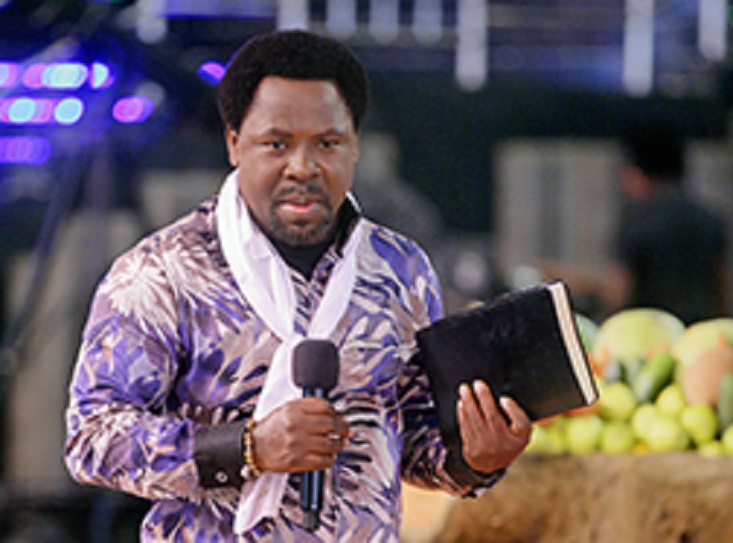The image of a South African pastor spraying his congregation with a pesticide called Doom during a ‘healing session’ has sparked a wave of outrage on the social media. This self-proclaimed prophet, Lethebo Rabalago, heads a church called Mount of Zion General Assembly in Limpopo province. A member of his congregation had an eye infection and he used the insecticide in an attempt to heal her.
The pastor further claimed that the spray could cure cancer and HIV. Rabalago posted on his church’s page how the ‘doom’ miracle product works: “Doom is just a name, but when you speak to it to become a healing product, it does. People get healed and delivered through doom,” Apparently he believed that by speaking to it (whatever that means) this killer of insects would become a healing substance for human beings. Really?
Well, it is evident that people who had prophetically been ‘delivered through doom’ had actually been doomed because they had exposed themselves to health risks. The insecticide contains harmful substance and spraying it on people could harm and not heal them. Rabalago has joined the growing list of notorious charlatans, self proclaimed pastors and prophets, in South Africa who use ‘unconventional means’ to heal and minister to their congregants.
Recently, images of these so-called men of God in South Africa debasing their church members and treating them like animals in the name of healing and ministrations have been circulating on the social media. We have seen photos of a self-styled prophet, Lesego Daniel of Rabboni Ministries telling members of his church to drink petrol or ordering them to eat grass and flowers.
Also Penuel Mnguni of the End Times Disciples Ministries has been seen feeding his congregants stones which he purportedly turned into bread. There were also other images where he was feeding them snakes and rats, which he supposedly turned into chocolate.
In response to these harmful and abusive actions of pastors and prophets, South Africa’s Commission for the Promotion and Protection of Cultural, Religious and Linguistic Communities recently conducted an investigative study into the commercialization of religion and the abuse of people’s belief system. It is not clear what actually came out of that investigation.
However with this case of Lethebo Rabalago and his Mount of Zion General Assembly, it is evident that not much has been achieved in terms of addressing these bizarre and horrific religious and healing practices in the country.
Prophetic Christianity is spreading across sub-Saharan Africa due to popular demand for miracles and faith healing. Health care especially presents a huge challenge to people across region. Due to pervasive poverty, most people cannot afford medical treatment and they look for magical and supernatural healing options.
Sometimes the medicine and treatment are available but they are not affordable. At other times, the cures are both unavailable and unaffordable. There is a huge gap between the health needs of the people and the available effective answers, cures and solutions.
Prophetic Christianity has become the latest trend in Christian faith to respond to the unmet needs of African Christians, the yearning for miraculous cures and solutions.
The self proclaimed pastors and prophets take advantage of these gaps. In fact these ‘men of God’ try to provide the missing links by using their ‘unconventional healing methods and services’ even though they are spurious cures that endanger the health and lives of the people.
However if one is to take a critical look at the ‘unorthodox healing methods’ of these Christian prophets’, they are similar to the healing claims in the Bible or the miracle cure cases that can be found in other religious traditions.
Christianity teaches that Jesus performed so many miracles including turning water into wine (John 2:1-11). It teaches that Jesus walked on water (Matthew 14:22-33) and told his followers that they could pick up snakes and scorpions, and drink poison and nothing would happen to them (Mark 16: 18; Luke 10: 19).
So how could anybody who believes in these miracle claims of Jesus or who does not question the morality of these risky and deadly directives of Jesus worry
about the antics of Christian prophets and pastors in South Africa. To put it simply, these prophets are imitating Christ and their members are exercising their faith.
For centuries and millennia, Christians both black and white, Europeans and Americans, Asians and Africans have believed these scriptural verses to be the true word of God. Christian missionaries have preached these verses as ‘gospel truths’ to people across the globe.
What is going on in South Africa and in many countries across Christian Africa is a reason for Africans to begin to question the veracity Biblical verses and start to doubt and disbelieve in them.
Africans need to realize that the Bible is not the literal word of God as many claim. In fact Africans need to be aware that it is dangerous and risky to blindly and unquestionably believe the Bible as the true and revealed word of God.
It is in exercising a skeptical view of scriptural and religious claims, of faith healing and faith healers, of peddlers of unconventional healing methods that South Africans, nay all Africans will avert prophetic Christianity and its looming ‘doom-contents’.







